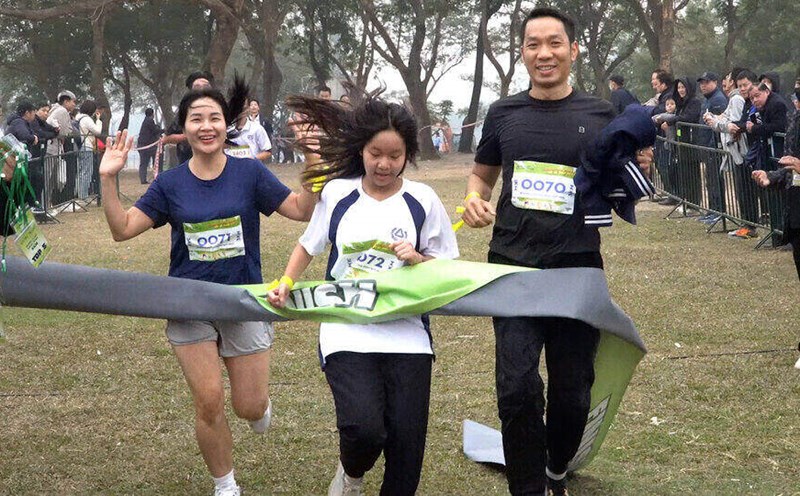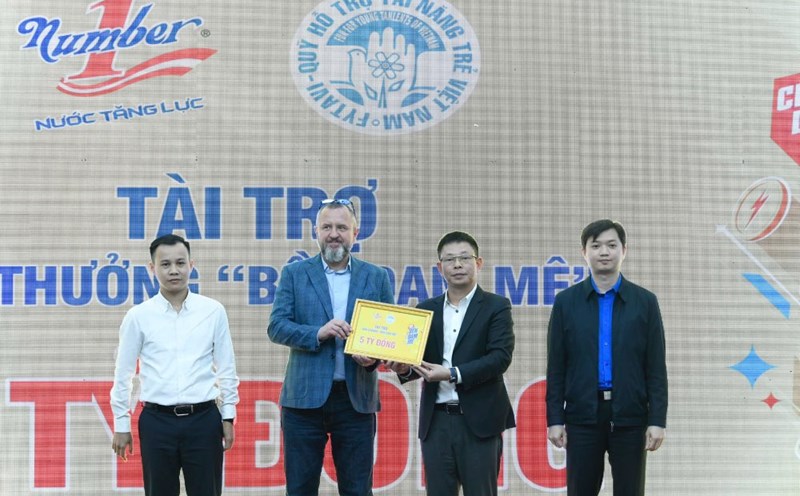I.
A few years ago, I happened to receive a phone call from a girl born in 2005, which is younger than my daughter. The girl introduced herself as Ha Linh, studying in grade 11 at Hanoi - Amsterdam High School for the Gifted. Linh is an active member of the Striped Project - one of the leading student projects on environment and recycling in Hanoi.
Learning about the projects of young people, I was even more interested in their " worthwhile thinking, worthwhile doing" attitude. As it turns out, Striped Project is a recycling project founded in June 2015 by a group of high school students in Hanoi. Faced with the serious waste of paper, the project was born with the goal of taking advantage of excess paper to create useful items such as notebooks and notebooks. These products are then donated to children in difficult circumstances, helping them have the opportunity to access better learning conditions. Not only focusing on recycling, Striped Project also organizes environmental education activities to raise awareness of natural resource protection, contributing to building a greener and more sustainable future.
"In parallel with environmental education, the project applies a "full waste" recycling model, turning waste paper into useful items for individuals, collectives and society. Through that, Striped Project not only helps reduce waste but also creates practical value for the community. One of the most important events of Striped Project is tinh yeu Nguyen Day - a volunteer trip to the highlands to organize environmental education and entertainment activities for children in difficult circumstances, Linh said.
The girl also talked about an event she organized with her friends. That is the event held at Choi Hong school (Trang Xa commune, Vo Nhai, Thai Nguyen) with the participation of children in difficult circumstances at the school. In addition to cultural activities and handmade instructions, Hanoi youth also gave meaningful gifts including candy, school supplies (books, pens, bleach, wax coloring), milk and handmade pencil boxes to the children.
From Linh, through research, I see that Hanoi students are very enthusiastic about participating in projects with high social significance. For example, few people expect that in Hanoi, there will be a group of young people to establish the "Fod Rescue Team". Taking advantage of self-awareness of food at restaurants and hotels that are still usable but often have to pay a fee, young people come up with the idea of collecting these foods (of course still intact, usable) to distribute to people in need.
Hanoi Food Rescue becomes the first and only pioneering charitable organization with the "food rescue" model established by high school students in Hanoi. After 13 years of operation since 2012, this organization has made a strong impression with the enthusiastic participation of more than 1,800 volunteers from universities and high schools.
Thanks to the tireless efforts, Hanoi Food Rescue has become an important bridge, bringing 83,000 meals from 30 restaurants, hotels and food processing units to more than 30,000 people in need of sharing. Hanoi Food Rescue not only focuses on distributing food to familiar destinations such as SOS Children's Village, Hoa Binh Kindergarten, Ngoc Son Center, K Hospital, National Children's Hospital, Center for Humanitarian Vocational Training - creating jobs for children with disabilities in Vietnam, and poor neighborhood Phuc Xa... but also focuses on activities to raise awareness of effective food use, fighting waste.
The group has successfully implemented many programs such as Tet Donation, The Hunger Games, Mid-Autumn's Giving, Help For Residents, Giao... In particular, the Tet Donation event has become a meaningful donation activity, mobilizing 42,000 meals and 16 tons of items (clothes, books, school supplies) for more than 2,300 students at 10 different schools.
Tet Donation 2025 was held on March 16 at Van An Primary School, Chi Lang District, Lang Son Province, becoming a warm "late" Tet for disadvantaged children in the highlands, helping them have more motivation and joy in life.
II.
Meeting young people, talking to them about projects, I plan to be more confident in a Vietnam that enters the era of growth. Young people, they all say that their jobs are very small, just hoping to contribute something to the community, to those in need.
But they themselves do not fully know that small actions done together in a community, in a generation will create great motivation.
For example, the issue of saving and combating waste. This is a big problem for the country. It is impossible to rise up and enter a new era without forming a widespread culture of thrift and anti-waste. This is not easy and the act of collecting garbage and handling food by young people is also partly a part of that culture.
In the article "Anti-waste", General Secretary To Lam frankly stated: "Wasting is still quite common, in many different forms, and has caused many serious consequences for development. In particular, it causes a decline in human resources, financial resources, reduced production efficiency, increased cost burden, resource depletion, and increased gap between rich and poor. Moreover, waste also reduces people's trust in the Party and State, creates invisible barriers in socio-economic development, and misses development opportunities for the country".
The General Secretary requested: Build a culture of preventing and combating waste; make the practice of thrift and combating waste a self-awareness, voluntary, daily food, drink, and clothing. Build a culture of thrift and anti-waste in agencies and organizations; encourage people to increase the practice of thrift and anti-waste, create the habit of valuing State assets, the efforts of the people, the contributions of the collective and the efforts of each individual; consider practicing thrift and fighting waste as a daily task. Synchronously implementing solutions to build a culture of thrift and awareness of thrift; scientific working thinking, effective time management, forming social moral responsibility associated with strictly implementing discipline and order".
III.
I firmly believe that today's young people, those who know how to protect the environment, know how to participate in charity activities to help the disadvantaged, know how to practice thrift and learn to strive will become good citizens, pioneering citizens of the country in the future.
The young generation of Vietnam is becoming the core force in the country's development. They do not limit themselves to the framework of tradition, but are ready to face major national problems with the mindset of " daring to think, daring to do, daring to take responsibility, daring to pioneer". From innovation to entrepreneurship, from technology to social activities, they are demonstrating their mettle, commitment, and aspiration to reach out.
In addition to community activities, Vietnamese youth also show that they are a proactive force in innovation and creativity. Startup and technical innovation contests in recent years have attracted many young people to participate, with breakthrough ideas in AI technology, blockchain, smart agriculture, digital economy... Enterprises founded by young people not only create jobs for thousands of workers but also contribute to raising Vietnam's reputation in the international arena.
However, the young generation of Vietnam is also facing many challenges. Professional qualifications and skills are still different between regions, the ability to adapt to new trends is still not synchronous. Taking advantage of digital technology can help young people keep up with international trends, but at the same time, it also brings challenges in cybersecurity, information exploitation and personal responsibility.
The young generation of Vietnam is becoming the ones to steer the country's ship towards the future. They dare to think, dare to do, dare to take responsibility and dare to pioneer in all fields. But to best promote that enthusiasm, the policy system needs to create more favorable conditions, educational institutions need to equip knowledge and practical skills better, and society needs to recognize the contributions of young people appropriately. Only when meeting those conditions can Vietnamese youth truly become the driving force for a developed and sustainable Vietnam.











